Daily Vocabulary Words: List of Daily Used Words in Leading Indian Newspapers
Hi there. Welcome to this special section @ Wordpandit. Our endeavour here is straightforward: highlighting daily vocabulary words that you would come across in leading newspapers in the country. We have included the following newspapers in our selection:
• The Times of India
• The Economic Times
• Hindustan Times
• Mint
• Indian Express
We are putting in extensive work to develop your vocabulary. All you have to do is be regular with this section and check out this post daily. This is your repository of commonly used words; essentially, we are posting a list of daily used words. Hence, this has significant practical application as it teaches you words that are commonly used in leading publications mentioned above.
Visit the website daily to learn words from leading Indian newspapers.
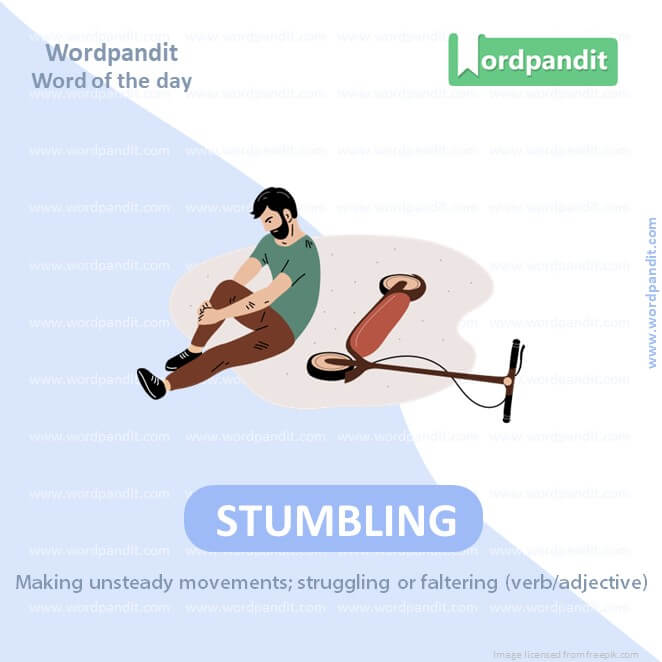
WORD-1: STUMBLING
CONTEXT: The biggest stumbling block for these girls and women is the patriarchs who decide what they study, when and who they will marry and whether they can have jobs.
SOURCE: Hindustan Times
EXPLANATORY PARAGRAPH: Imagine walking unsteadily or tripping over something, causing a momentary loss of balance. That action of making an unsteady movement or struggling to maintain balance is called “stumbling.” It’s like encountering obstacles or difficulties that momentarily disrupt progress.
MEANING: Making unsteady movements; struggling or faltering (verb/adjective).
PRONUNCIATION: STUHM-bling
SYNONYMS: faltering, tripping, hesitating, struggling, fumbling
USAGE EXAMPLES:
1. The athlete stumbled during the race but managed to recover and finish strong.
2. His stumbling speech indicated nervousness in front of the audience.
3. The company experienced stumbling growth due to economic challenges.
4. Stumbling blocks in the project delayed its completion.
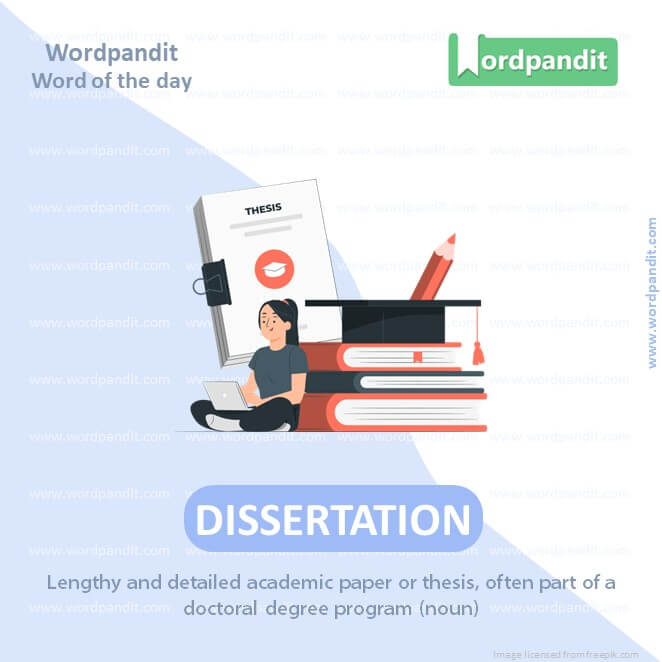
WORD-2: DISSERTATION
CONTEXT: I first visited the party office in the summer of 2008, when I was writing my Masters’ dissertation at the Tata Institute of Social Sciences (TISS), Mumbai, on the rise of the BSP.
SOURCE: Hindustan Times
EXPLANATORY PARAGRAPH: A dissertation refers to a lengthy and detailed academic paper or thesis, typically written as part of a doctoral degree program. It involves original research, analysis, and presentation of findings on a specific topic or subject.
MEANING: Lengthy and detailed academic paper or thesis, often part of a doctoral degree program (noun).
PRONUNCIATION: dis-er-TEY-shuhn
SYNONYMS: thesis, paper, treatise, research project, doctoral thesis
USAGE EXAMPLES:
1. He defended his dissertation on linguistics before a panel of professors.
2. Writing a dissertation requires extensive research and critical analysis.
3. The dissertation examined the impact of climate change on marine ecosystems.
4. Her dissertation was published as a book after receiving accolades.
WORD-3: TREMENDOUS
CONTEXT: It is being argued that Mayawati is under tremendous pressure to not engage politically if she wants to avoid going to jail.
SOURCE: Hindustan Times
EXPLANATORY PARAGRAPH: Imagine something that is exceptionally large, powerful, or impressive in scope or effect. That quality of being extraordinarily great, significant, or impactful is called “tremendous.” It’s like something that exceeds expectations or is remarkable in its magnitude.
MEANING: Exceptionally large, powerful, or impressive; extraordinary (adjective).
PRONUNCIATION: tri-MEN-duhs
SYNONYMS: enormous, huge, massive, immense, remarkable
USAGE EXAMPLES:
1. The company’s growth in revenue was tremendous over the past year.
2. She received tremendous support from her colleagues during the project.
3. The film’s success was attributed to its tremendous visual effects.
4. The impact of the pandemic on the economy was tremendous.
WORD-4: PROPONENTS
CONTEXT: The proponents of this “fatal flaw” hypothesis cite many examples of past and present leaders, and how their blind love proved to be their tragic undoing.
SOURCE: Hindustan Times
EXPLANATORY PARAGRAPH: Proponents are individuals or groups who support or advocate for a particular idea, cause, or belief. They actively promote or defend their position, often seeking to persuade others to adopt their views or actions.
MEANING: Supporters or advocates of a particular idea, cause, or belief (noun).
PRONUNCIATION: pruh-POH-nuhnts
SYNONYMS: advocates, supporters, champions, defenders, backers
USAGE EXAMPLES:
1. The proponents of animal rights organized protests against animal cruelty.
2. She is one of the leading proponents of sustainable agriculture in the region.
3. The proponents of the new policy argue for its benefits to the community.
4. The debate featured proponents from both sides presenting their arguments.
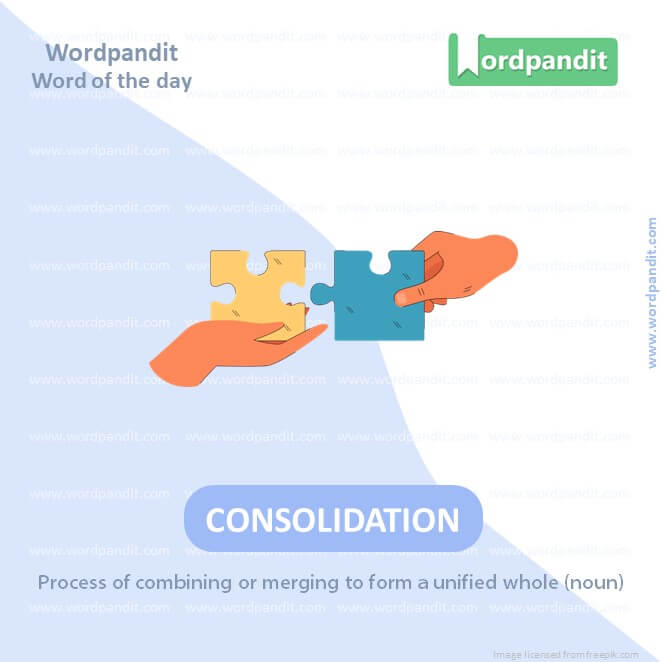
WORD-5: CONSOLIDATION
CONTEXT: they go one step further, arguing that the BSP has been selectively putting up candidates to prevent any consolidation of the anti-BJP vote in this election.
SOURCE: Hindustan Times
EXPLANATORY PARAGRAPH: Consolidation refers to the process of combining or merging things to form a unified whole. It often involves bringing together resources, efforts, or entities to strengthen or streamline operations, leading to greater efficiency or effectiveness.
MEANING: Process of combining or merging to form a unified whole (noun).
PRONUNCIATION: kuhn-SOL-i-DEY-shuhn
SYNONYMS: integration, merging, unification, amalgamation, combination
USAGE EXAMPLES:
1. The consolidation of departments improved communication within the organization.
2. The consolidation of financial data into a single platform simplified reporting.
3. The political parties discussed a possible consolidation of their agendas.
4. The company’s expansion strategy included the consolidation of market share.
WORD-6: INCOHERENT
CONTEXT: It also seemed ideologically incoherent in its pursuit of power.
SOURCE: Hindustan Times
EXPLANATORY PARAGRAPH: Imagine something that lacks logical or understandable connections, making it difficult to follow or comprehend. That quality of being disjointed, illogical, or unclear in expression or thought is called “incoherent.” It’s like having ideas or statements that don’t fit together smoothly.
MEANING: Lacking logical or understandable connections; disjointed or unclear (adjective).
PRONUNCIATION: in-kuh-HEER-uhnt
SYNONYMS: disjointed, muddled, confused, unintelligible, jumbled
USAGE EXAMPLES:
1. Her arguments were incoherent and failed to convince the audience.
2. The patient’s speech was incoherent due to the effects of medication.
3. The essay received low marks for its incoherent structure and reasoning.
4. The policy proposal was criticized for its incoherent implementation plan.
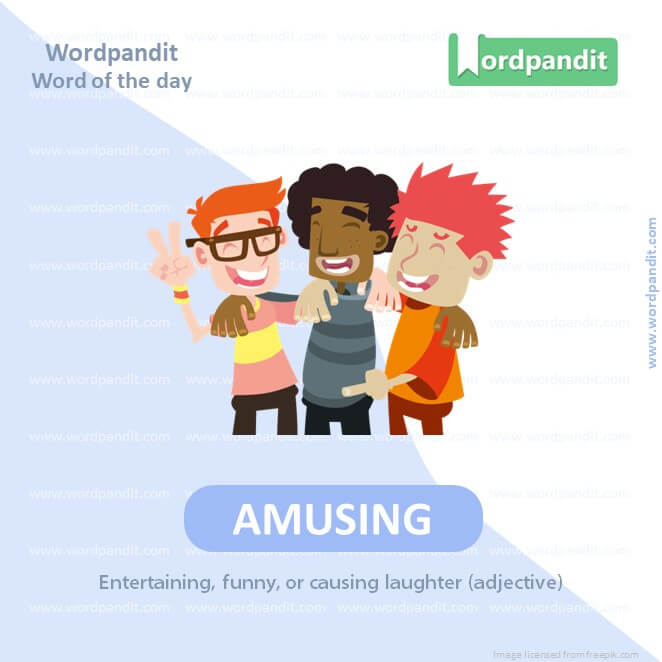
WORD-7: AMUSING
CONTEXT: Is it a mere, slightly amusing distraction or is there more to it than meets the eye?
SOURCE: Hindustan Times
EXPLANATORY PARAGRAPH: Imagine something that brings laughter or light-hearted enjoyment, often by being funny or entertaining. That quality of being entertaining, funny, or causing laughter is called “amusing.” It’s like providing moments of joy or amusement.
MEANING: Entertaining, funny, or causing laughter (adjective).
PRONUNCIATION: uh-MYOO-zing
SYNONYMS: entertaining, funny, humorous, comical, delightful
USAGE EXAMPLES:
1. The children’s book was filled with amusing illustrations and stories.
2. His witty remarks during the meeting were amusing to his colleagues.
3. The comedian’s amusing anecdotes had the audience in stitches.
4. The movie’s plot was both suspenseful and amusing, keeping viewers engaged.
WORD-8: BEFUDDLING
CONTEXT: Aditi Singh, former Congresswoman and today the Bharatiya Janata Party (BJP) legislator from the Rae Bareli Sadar assembly segment told me that “at a personal level…” she found it “…hilarious and at a professional level, it’s befuddling”.
SOURCE: Hindustan Times
EXPLANATORY PARAGRAPH: Imagine feeling confused or bewildered, often due to something being unclear or difficult to understand. That experience of being perplexed, confused, or puzzled by something is called “befuddling.” It’s like being mentally muddled or disoriented.
MEANING: Perplexing, confusing, or puzzling (adjective).
PRONUNCIATION: bi-FUHD-ling
SYNONYMS: perplexing, confusing, bewildering, puzzling, confounding
USAGE EXAMPLES:
1. The technical manual was filled with jargon, leaving readers befuddled.
2. The sudden change in plans was befuddling for everyone involved.
3. The math problem proved to be particularly befuddling for the students.
4. Her cryptic messages were often befuddling to those who received them.
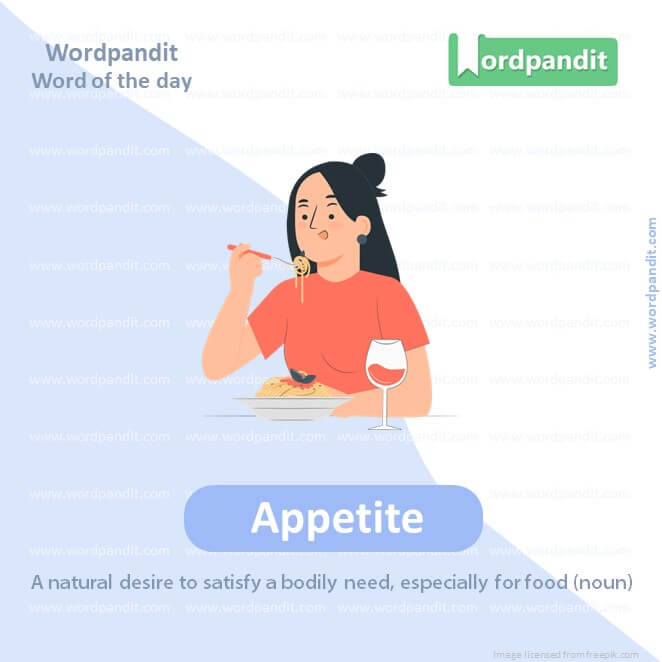
WORD-9: APPETITE
CONTEXT: This is not the first time Vadra has expressed an appetite for active electoral politics.
SOURCE: Hindustan Times
EXPLANATORY PARAGRAPH: Appetite refers to the desire or craving for food, often associated with hunger or enjoyment of eating. It can also metaphorically refer to a strong desire or inclination for something, such as knowledge, adventure, or success.
MEANING: A natural desire to satisfy a bodily need, especially for food (noun).
PRONUNCIATION: AP-i-tahyt
SYNONYMS: craving, hunger, desire, longing, inclination
USAGE EXAMPLES:
1. The appetizers served at the party whetted everyone’s appetite for the main course.
2. Her appetite for adventure led her to travel to remote places.
3. The team’s appetite for success motivated them to work harder.
4. The novel’s intriguing plotline sparked readers’ appetite for more stories.
WORD-10: MIRACULOUS
CONTEXT: The seemingly miraculous has less to do with miracles and more to do with a commitment to meet the urgency of people’s need for access to information.
SOURCE: Hindustan Times
EXPLANATORY PARAGRAPH: Imagine something that is extraordinary and seemingly impossible, often associated with supernatural or divine intervention. That quality of being extraordinary, wondrous, or defying natural laws is called “miraculous.” It’s like witnessing something that goes beyond normal expectations or explanations.
MEANING: Extraordinary and seemingly impossible; wondrous (adjective).
PRONUNCIATION: mi-RAK-yuh-luhs
SYNONYMS: extraordinary, amazing, incredible, wondrous, supernatural
USAGE EXAMPLES:
1. The miraculous recovery of the lost hiker amazed everyone involved in the search.
2. The discovery of a cure for the disease was described as miraculous by scientists.
3. The sudden turnaround in the company’s fortunes was nothing short of miraculous.
4. The miracle of life is often described as a series of miraculous events.
Vocabulary Daily
Language learning is a beautiful yet complex dance, where ‘vocabulary daily’ connote the integral beats. These everyday words form the essence of most of our conversations and are the cornerstone of effective communication. However, a methodical approach is required to efficiently learn ‘vocabulary daily’.
One key approach to learning ‘vocabulary daily’ is consistency. Engaging with a few words every day consistently fosters better understanding and recall than sporadic cramming sessions.
Interactive tools can add a touch of excitement and ease to mastering ‘vocabulary daily’. Flashcards, word of the day calendars, language learning apps can make the learning experience fun and fruitful. These tools not only introduce new words but often provide a context of use, aiding your understanding.
Making ‘vocabulary daily’ a part of your daily life is a surefire success strategy. Incorporating these words into day-to-day conversations, writing, or social media interactions greatly enhances retention and usage. It also allows you to witness firsthand the impact of a rich vocabulary on the clarity of expression.
To effectively grasp ‘vocabulary daily’, always keep a learner’s curiosity. Explore books, news articles, music, and podcasts in the respective language. This exposure helps in absorbing the words in a real-world context, thus building a robust bond with ‘vocabulary daily’.
In conclusion, understanding ‘vocabulary daily’ is an ongoing process that necessitates consistency, interactive learning, practical application, and a learner’s curiosity. By following this comprehensive approach, the task of mastering ‘vocabulary daily’ becomes less of a chore and more of an enriching journey that can lead to eloquent and effective communication. So, step into the exciting world of ‘vocabulary daily’ and let it colour your language learning adventure with shades of clarity, confidence, and joy.













